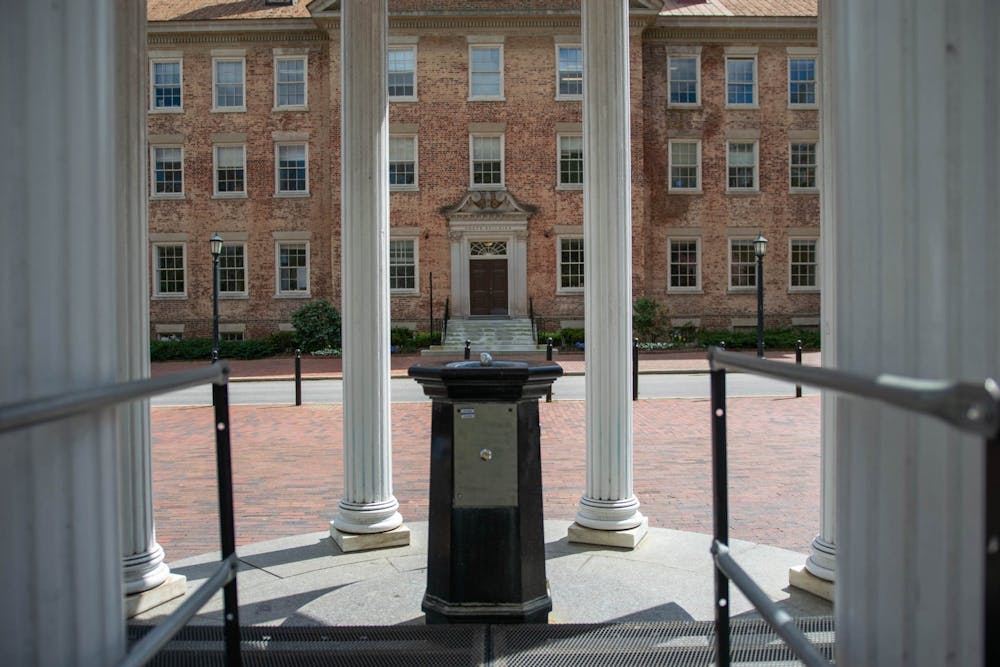On Wednesday, the Committee on Academic Freedom and Free Expression convened virtually to make recommendations on campus-wide free speech six days after a pro-Palestine demonstration occurred on the steps of Wilson Library. The Committee discussed a commitment to institutional neutrality, clarified legalities surrounding the demonstration and considered making guidelines regarding free speech on campus clearer.
Chancellor Kevin Guskiewicz formed the Committee in January to advance academic freedom at the University. Although Wednesday’s meeting was classified as an emergency meeting, Christian Lundberg, chairperson of the Committee, said the meeting was a regularly scheduled monthly meeting.
What’s New?
- The Committee discussed methodologies for maintaining institutional neutrality to support the safety of UNC’s students.
- Kamrhan Farwell, vice chancellor of communications, said there has already been a commitment from the Chancellor, the Board of Trustees, the Board of Governors and from the N.C. legislature regarding institutional neutrality.
- Mark McNeilly, a professor at the Kenan-Flagler Business School, added that there could be better guidelines for institutional neutrality, especially regarding when the University can and cannot make a statement on issues that pertain to UNC students.
- “I've had lots of conversations with professors about institutional neutrality and academic freedom, and that is partially why we are here — people aren't clear on what it is,” McNeilly said. “We need to lay it all out for everyone and educate people on it at all levels of the University.”
- Legal questions regarding the protestors’ actions during the Oct. 12 demonstration were introduced by the Committee members.
- McNeilly presented two legal questions to the Committee — whether it is legal to wear masks during a protest in North Carolina and whether protestors can block entrances to buildings by pedestrian traffic.
- Vice Chancellor and General Counsel to the University Charles Marshall said those issues would fall to law enforcement and prosecutors depending on the particular situation.
- “I did recognize that it has been a topic that people have asked about, especially law enforcement,” Marshall said. “We're not unique in North Carolina in terms of a law similar to this. There are a lot of them across the country and there has been litigation.”
- The Committee also analyzed forms of free expression during the protest, specifically when speech can be constituted as permitted speech or a form of harassment.
- McNeilly asked the Committee whether the chant “From the River to the Sea” from the protest was permitted speech. He said the Anti-Defamation League and others may see the chant to be a call for the ethnic cleansing of Jews from Israel. Additionally, he asked whether a demonstration flyer with a “terrorist paraglider” on it could be considered legal speech from an ethnic group harassment standpoint.
- McNeilly said he has been in communication with the University Office for Diversity and Inclusion and Equal Opportunity and Compliance Office to determine the permissibility of those statements.
- The Committee engaged in conversations to develop clearer guidelines for academic freedom and free expression on campus.
- Joan Krause, a professor in the UNC School of Law, said many of the issues covered during the meeting reflect what the Committee should be discussing as part of its role on campus because some issues are not purely legal issues.
- “Part of what we're doing is we're not setting legal rules here, but we're setting our expectations for being part of this community,” Krause said. “It's perfectly possible for something to be legal, and yet in violation of how we hope that our community will actually work together.”
- Lundberg said the various viewpoints on academic freedom and free expression discussed during the meeting will be compiled into an integrated framework document with future responsibilities and recommendations for the University.
The Committee will meet again on Nov. 15.



